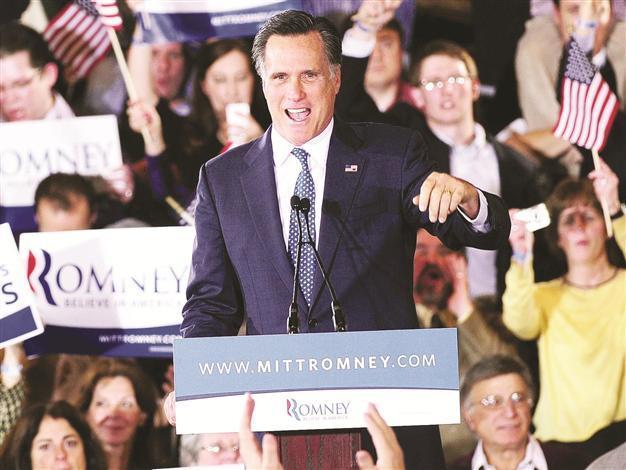Romney fails to seal the deal on Super Tuesday
WASHINGTON

Republican presidential hopeful Mitt Romney attends a Super Tuesday Republican primary elections evening in Boston, Massaschusetts on March 6. Romney wins six states in the race and picks up at least 212 of the 419 delegates. AFP photo
U.S. presidential hopeful Mitt Romney inched closer to becoming the Republican nominee, winning six states on Super Tuesday in the turbulent campaign to select a rival to President Barack Obama. Romney, however, failed to land a knockout blow against his main rival, Rick Santorum, who won three contests, benefiting the incumbent Obama.The mixed results in the 10 state contests held March 6 suggest that Romney, despite padding his lead in the tally of delegates who will pick the nominee, is still unable to win over some conservatives and rally the party behind his candidacy. Romney methodically moved closer to the 1,144 delegates needed to win the party’s nomination, but a strong showing by Santorum underscored the front-runner’s continued inability to win over large swathes of the Republican base, who view his past as a moderate Massachusetts governor with suspicion.
Romney picked up at least 212 of the 419 delegates March 6, while Santorum won at least 84, Newt Gingrich at least 72 and Ron Paul at least 22, according to Associated Press calculations. In the overall race for delegates, Romney leads with 415, Santorum has 176, Gingrich has 105 and Paul has 47.
‘Counting down days until November’
With Santorum and Gingrich energized by their wins, the often-acrimonious race will likely continue for weeks or months, perhaps weakening the eventual nominee and benefiting Obama, whose standing in opinion polls has improved. “Tonight we are counting up the delegates for the convention and counting down the days until November,” Romney told supporters in his home state of Massachusetts, Reuters reported.
Romney scored a home-state win in Massachusetts, where he served a governor, to go with primary victories in Vermont and in Virginia, where neither Santorum nor Newt Gingrich was on the ballot. He later added the Idaho and Alaska caucuses to his column. Santorum won the primaries in Oklahoma and Tennessee and the North Dakota caucuses.
But the most closely watched contest was in Ohio, a heavily populated Midwestern industrial state often seen as a bellwether in presidential elections. It was a test of strength for Santorum, who was a U.S. senator from neighboring Pennsylvania. Romney trailed much of the night but rallied near midnight. With 99 percent of Ohio’s precincts reporting, he had 38 percent to Santorum’s 37 percent, an uncomfortably close margin for a candidate who had spent nearly four times as much money as his rival in the state. He led Santorum by about 12,000 votes out of the more than 1.1 million cast.
















